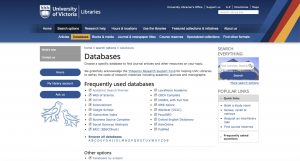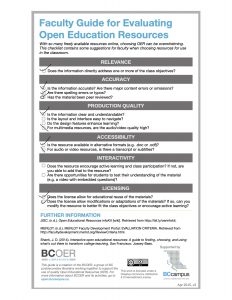Online educational content can be described as the resources, knowledge and information that make up an online course or educational platform. This content is everything that is taught by an individual and absorbed by another. On the other hand, openly licensed educational content, or open educational resources (OER) can be described as the same “teaching, learning and research resources that have been released under an intellectual property license that permits their free use and re-purposing by others” (OER Africa, n.d). For example, online educational content could include something like notes or slides that one of my UVic professors posts to the class website. I have permission to view and use these notes and slides for their course, but I do not have permission to distribute them, adapt them for another course or re-purpose them in anyway. An example of an OER would include the University of Victoria’s library data base system (https://www.uvic.ca/library/find/databases/index.php). Students, faculty and alumni are able to search a collected database of peer reviewed articles and studies that have been licensed for use and distribution all in one easy to access way.

After reviewing this OER using the evaluation guideline from OER Africa’s tutorial, I found that depending on the specific database that is being used to conduct the search, access to knowledge is not always the easiest or user-friendly. I have included the guideline here with my evaluation included of the database. Luckily, when students are using these databases, they know that they are getting quality content that can be used in an academic setting, though often times they have to ensure the “peer reviewed” button is clicked before conducting their research. Unfortunately, I did not find that any of the educational resources included a level of interactivity, though I can understand as these are quite high level academic sources there isn’t much of a desire for that. Often times I find myself having trouble focusing on the content presented in a long paper or journal article, so perhaps having embedded questions or quizzes to complete after the readings may inspire students to dive a little deeper into the readings that are being assigned.

As a student, I believe that OER’s have endless possibilities when it comes to learning effectively and efficiently. They are a great tool to ensure that students have equal opportunity to learn wherever they may be and whatever societal stipulations may be holding them back from a more “traditional” learning approach. One of the great things that draws me towards online based classes, such as EDCI 339 is the level of accessibility and online resources that are provided to me during my learning process. I have found that I can take a lot more out of classes that give me tools and resources that I am interested in not only learning more about but using in other ways during my educational career and beyond, which is why OER’s are such a great resource for students to have the ability and opportunities to use!
References:
OER Africa. (n.d.). Retrieved from https://www.oerafrica.org/book/welcome
Photo example 1 by Ivory Heshka
Photo example 2 by Ivory Heshka
Photo by Sergey Zolkin on Unsplash

Leave a Reply